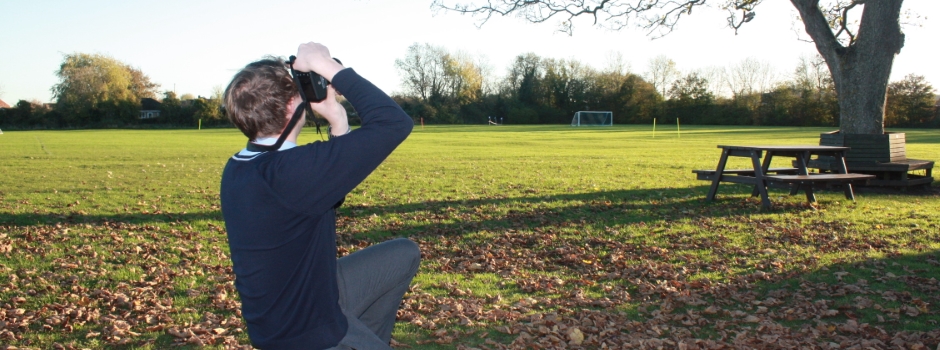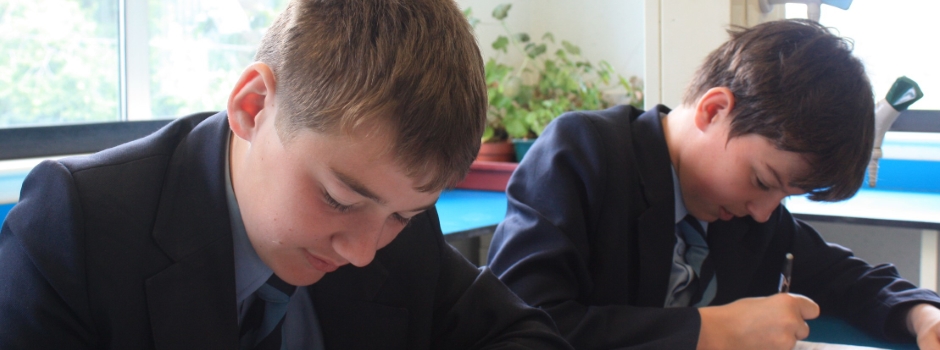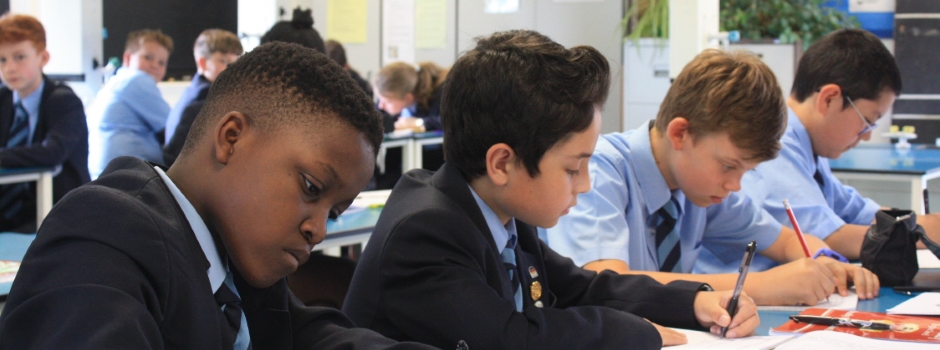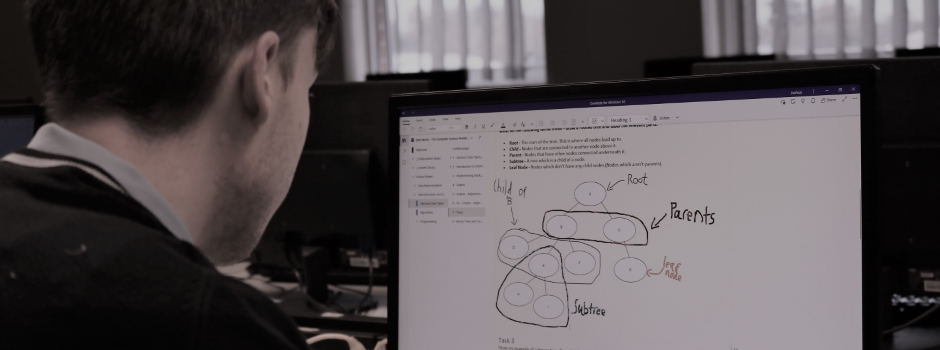



















































"I am unable to praise it enough or express how supportive and nurturing I have felt the entire staff to be."
Year 11 - Curriculum on a Page
Showing the curriculum by year
Year 11
Curriculum Details - 2023/2024 (Current)
| Subject | Term 1 | Term 2 | Term 3 | Term 4 | Term 5 | Term 6 |
| Art | Natural Forms 3D design. Working from direct observation, experimenting with a variety of media, annotation, analysis. Designing and making a ceramic piece. | Natural Forms 3D design. Mock exam preparation and mock exam final piece. Creating a 3D ceramic piece. | GCSE Exam paper issued. Working on exam preparation work in sketchbook. Painting and presenting ceramic piece. | Component 1 - Portfolio Selecting and improving best work for portfolio. Final deadline Easter. Final exam to take place before Easter. | Mounting and presentation of work for moderation. Completion of digital portfolio. Revision. | Transition work Research into the importance of drawing. Developing work on the theme of 'Transformation'. |
| Biology | Classification and the development of understanding of genetics and evolution: Variation, evolution, selective breeding, genetic engineering, speciation (Biology only), fossils and classification. | Adaptation, interdependence and competition, organisation of ecosystems: Communities, adaptation, carbon and water cycles, decomposition (Biology only). Required practicals 9 and 10. | Biodiversity and the effects of human interactions on ecosystems: Waste management, land use, global warming, deforestation, maintaining biodiversity. | Trophic levels and food production: Factors effecting food security, farming techniques, sustainable fishing, biotechnology (Biology only). Review of fundamental ideas, revision technique, advice and exam skills and exam question practice. | Review of fundamental ideas, including a complete summary of required practical activities. Revision technique advice and exam skills and exam question practice. | Independent preparation and completion of external exams: Biology and Trilogy. Transition work including a choice of tasks on statistical analysis, DNA, biochemistry, gaseous exchange and the biological significance of water. Booklet of key concepts that form the foundation of the study of Biology. |
| Business Studies | Marketing - identifying and satisfying customer needs, segmentation, market research, 'product' in the marketing mix including product differentiation, product lifecycle and product portfolio (Boston matrix), | Marketing - 'price' - methods and factors influencing price, 'Promotion' - methods and the factors influencing the selection, 'Place' - distribution channels. Ethical considerations and consumer law, E/M commerce, digital communication, globalisation and the competitive environment. | Finance - sources of finance, both internal and external, how interest rates affect businesses, both positively and negatively, cash flow and ethical considerations related to the financial operations within a business. | Finance - financial terms and calculations, exchange rates for businesses that import/export, average rate of return covering why businesses need to invest, the importance of breaking even and how this can be calculated. | Finance - financial statements including the income statement and balance sheet - the reasons for preparing them, the importance of them and components of each. Interpreting data from financial statements and making judgements on performance. | Develop your knowledge of ‘real world’ business issues, including reading appropriate newspapers/watching appropriate programmes on TV, including the News, ‘The Apprentice’, and ‘Dragons Den’. Use the websites provided in order to do some further reading around the subject. |
| Chemistry | Organic Chemistry 2 (Separate only): Reactions of alkenes, study of alcohols, carboxylic acids and esters.Addition and condensation polymerisation, including naturally occurring polymers such as DNA. | Electrolysis: molten and aqueous examples, half equations and redox. Including required practical - the electrolysis of aqueous solutions. Fuel cells and batteries (Separate only) | Chemical analysis: pure substances and formulations, chromatography, testing for gases. Separate only: Flame testing, testing for cations and anions, instrumental analysis. | Equilibria: Le Chatelier, the effect of changing concentration, pressure, temperature on eqm. Separate: eqm & the Haber process, fertilisers. Using resources: Potable water, water treatment, including req. practical. Metal extraction, LCAs. Separate: Corrosion, alloys, ceramics, polymers, composites | Review of fundamental ideas, including a complete summary of required practical activities. Revision technique advice and exam skills and exam question practice. | Independent preparation for and completion of external exams: Chemistry and Trilogy. Transition work including the research and summary of the development of atomic theory from first ideas to present day and booklet of key concepts that form the foundation of the study of Chemistry. |
| Computer Science | Programming - Review of all areas Software and classification of programming languages. System, application and utility software. | Environmental, ethical and legal issues relating to computing. | Revision - Y9 topics. | Revision - Y10 topics. | Revision - Targeted topic revision. | Programming Projects - working on developing the programming skills to produce tasks ready for larger programming writing at A Level. |
| DT: Graphics | Non-examined element; Writing of a specification. Generation of initial ideas. Review of initial ideas. 3.3.4.1 Generate imaginative ideas 3.3.5 Communication of design ideas 3.3.7 Selection of materials and components | Non-examined element; Development of design ideas into a chosen design. Review of chosen idea. 3.3.10 Specialist tools and equipment 3.3.11 Specialist techniques and processes 3.3.4.2 Explore and develop ideas 3.3.6 Prototype development 3.3.9 Material management HL Revision Mock | Section Completion of Section E Section F Evaluation of product Evaluation against specification Client feedback Submit coursework | Review coursework and ensure evidence is in place for all sections of the coursework. Revision for main exam | Revision for main exam assignments to be submitted onto teams leading up to the exam in June. | Revision for main exam assignments to be submitted onto teams leading up to the exam in June. |
| DT: Resistant Materials | Non-examined element; Writing of a specification. Generation of initial ideas. Review of initial ideas. 3.3.4.1 Generate imaginative ideas 3.3.5 Communication of design ideas 3.3.7 Selection of materials and components | Non-examined element; Development of design ideas into a chosen design. Review of chosen idea. 3.3.10 Specialist tools and equipment 3.3.11 Specialist techniques and processes 3.3.4.2 Explore and develop ideas 3.3.6 Prototype development 3.3.9 Material management HL Revision Mock | Section Completion of Section E Section F Evaluation of product Evaluation against specification Client feedback Submit coursework | Review coursework and ensure evidence is in place for all sections of the coursework. Revision for main exam | Revision for main exam assignments to be submitted onto teams leading up to the exam in June. | Revision |
| English | Language skills - revision and development Literary Heritage: Shakespeare play (Romeo and Juliet or Macbeth) | Language skills - revision and development Literary Heritage: Shakespeare play (Romeo and Juliet or Macbeth) | Poetry Anthology and Language skills | Poetry Anthology and Language skills | In Terms 3-5, students focus on deepening their knowledge and understanding of their literature texts and further securing their language skills. | Transition work for Literature broadens students' experience of great texts through a diverse and engaging summer reading list and a small literature project. Language work introduces new topics including a small project on idiolect. |
| French | Theme 1 - Me, my family and my friends, technology in everyday life and free-time Skills: role-play, photo card and general conversation for speaking exam | Theme 1 - Customs and festivals Theme 2 - Home and local area and social issues Skills: 90, 150-word tasks and translation for writing exam | Theme 2 - Holidays and global issues Theme 3 - Life at school, future academic plans and work Skills: answering in French and in English for the reading and listening exams | Prepare for exam series with a range of revision sessions on each skill area. Focus on technique for speaking exam. | Revision and external exams | Transition Work: 1) Read up on the films/books available for study at A-level. 2) Watch films/TV shows on Netflix to improve your understanding of the language, the culture. 3) Listen to online radio/podcasts 4) Start learning AS vocab. 5) Prepare 2 minute presentation about your summer holidays. |
| Geography | 3.2.3.1 Resource management - food, water and energy. 3.2.3.4 Energy - areas of surplus and deficit, factors affecting energy availability, impacts of energy insecurity, strategies to increase energy supply, renewable energy supplies. | 3.3.2 Fieldwork - urban. 3.1.1.1 Natural hazards - types and factors affecting. 3.1.1.2 Tectonic hazards - plate tectonic theory, plate margins, earthquakes; cause, effect, response and management. | 3.1.1.3 Weather hazards - atmospheric circulation model, tropical storms; characteristics, cause, effect, response and management. Extreme weather; causes, impacts and management strategies. | 3.1.1.4 Climate change - evidence for climate change, cause; natural and human, effects and managing climate change. 3.3.1 Issue evaluation | GCSE Pre-Release Material Revision | Pre-reading for A level Changing Places: Using 3 locations you visit over the summer, describe the sense of place and place perception in that area. |
| German | Theme 1 - Me, my family and my friends, technology in everyday life and free-time Skills: role-play, photo card and general conversation for speaking exam | Theme 1 - Customs and festivals Theme 2 - Home and local area and social issues Skills: 90, 150-word tasks and translation for writing exam | Theme 2 - Holidays and global issues Theme 3 - Life at school, future academic plans and work Skills: answering in German and in English for the reading and listening exams | Prepare for exam series with a range of revision sessions on each skill area. Focus on technique for speaking exam. | Speaking exam - exam prep plus actual exam Reading and listening exam - exam prep and actual exam Writing exam - exam prep | Transition Work: 1) Read up on the films/books available for study at A-level. 2) Watch films on fluentu/netflix to improve your understanding of the language, the culture. 3) Listen to online radio. 4) Start learning AS vocab. 5) Prepare 2 minute presentation about your holidays. |
| History | Medicine through Time, 1250 - present; Section A topics; medical treatment and developments during WWI. Then Section B topic, on causal theories, medical treatments and preventative measures during the medieval period 1250-1500. | Medicine Through Time, 1250 - present; Section B topics on casual theories, medical treatments and preventative measures in the Renaissance period (1500-1750) and the 18th and 19th centuries. Case studies on the Black Death & Plague and surgery. | Medicine Through Time 1250 - present; Section B topics on casual theories, medical treatments and preventative measures for the period 1900 to the present. Case Studies Fleming, Florey and Chain. | Finish off the period 1900 to the present, with special focus on how the diagnosis and treatment of lung cancer has developed. Revision will then start based on programmes worked out specifically for the year group/classes. | Main revision period, with emphasis on exam style questions, expectations of each type and practising planning and answering. | Summer Work set for Russian Revolution Unit - students are given a list of key terms which they need to research meanings for. |
| Mathematics | SA Volume – Spheres. Trigonometry – Cosine rule, area triangle. Algebra – Review basics, factorising, algebraic fractions, change the subject. TERM ASSESSMENT – CALCULATOR PAPER | Bounds – error intervals, degree of accuracy, calculating with bounds. ASSESSMENT – Moc examination – GCSE calculator paper Revision topics identified from the mocks Vectors – notation, column, scalar multiples, combining, length, resultant, geometric proof. | Bounds of accuracy; truncation, error intervals, calculations of bounds. Vectors. | Revision topic Proportion – review direct & inverse Proof – Algebraic Graphs – transformations, area under, gradient of, trig functions. ASSESSMENT – regular GCSE papers. | Revision - topic targeted and approach to different questions. | Exams Over the summer, 7 tasks are set on TEAMS for those who have chosen to do A Level maths, depending on achieving the entry grade. |
| Music | Solo and Ensemble Performance exams. Both to be completed by Half Term. Composition: Complete a full composition to a brief set by the exam board. Perfect a previous composition to submission standard. Appraising: Area of Study 2: Music for Ensemble and unprepared listening exercises. | Composition: Complete a full composition to a brief set by the exam board. Perfect a previous composition to submission standard. Both are due before Christmas. Appraising: Area of Study 2: Music for Ensemble and unprepared listening exercises. | Appraising: Area of Study 3: Music for Film and unprepared listening exercises. | Appraising: All Area’s of Study. Listening exercises, vocabulary and exam techniques. Final chance for resits of performance exam or composition amendments. | Appraising: Exam Practice and revision. | Exam Leave – Appraising exam. Preparation for ks5. |
| Physics | density of materials, required practical 5, changes of state, internal energy and energy transfers, changes of state and specific latent heat, particle motion in gases, pressure in gases (physics only) | Structure of an atom, mass number, atomic number and isotopes, development of the model of the atom, radioactive decay and nuclear radiation, nuclear equations, half-life, hazards and uses of radiation (physics only), nuclear fission and fusion (physics only) | Poles of a magnet, magnetic fields, the motor effect, electromagnetism, Fleming's left hand rule, electric motors, loudspeakers (physics only), induced potential (physics only), transformers and the national grid (physics only) | Our solar system, the life cycle of a star, orbital motion, natural and artificial satellites, red shift (all physics only) Trilogy group begins revisiting ideas from year 9 and 10 to target problem areas and build familiarity with exam questions. | Review of fundamental ideas, including a complete summary of required practical activities. Revision technique advice and exam skills and exam question practice. | Independent preparation and completion of external exams: Physics and Trilogy. Transition work including a choice of research tasks on cosmology, cold temperatures, quantum mechanics, medical physics or other physics topic. Booklet of key concepts that form the foundation of the study of Physics. |
| PSHE | Health and well-being. Building for the future - Self-efficacy, stress management, and future opportunities. | Living in the wider world. Next steps - Application processes, and skills for further education, employment and career progression. | Relationships. Communication in relationships - Personal values, assertive communication (including in relation to contraception and sexual health), relationship challenges and abuse. | Health and well-being. Independence - Responsible health choices, and safety in independent contexts. | Relationships. Families - Different families and parental responsibilities, pregnancy, marriage and forced marriage and changing relationships. | N/A |
| Spanish | Theme 1 - Me, my family and my friends, technology in everyday life and free-time Skills: role-play, photo card and general conversation for speaking exam | Theme 1 - Customs and festivals Theme 2 - Home and local area and social issues Skills: 90, 150-word tasks and translation for writing exam | Theme 2 - Holidays and global issues Theme 3 - Life at school, future academic plans and work Skills: answering in Spanish and in English for the reading and listening exams | Prepare for exam series with a range of revision sessions on each skill area. Focus on technique for speaking exam. | Speaking exam Reading and listening: revision and exam preparation Writing exam: revision and exam preparation | Transition Work: 1) Read up on the films/books available for study at A-level. 2) Watch films in Spanish to develop cultural knowledge. 3) Listen to online radio. 4) Do some background reading on the Spanish Civil War and Franco's Dictatorship 5) Prepare 2 minute presentation about your holidays. |